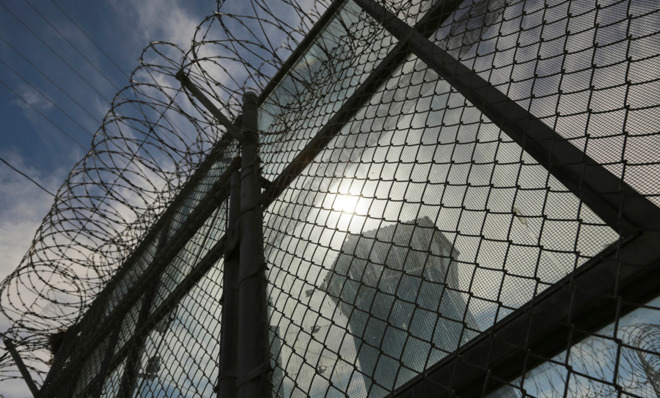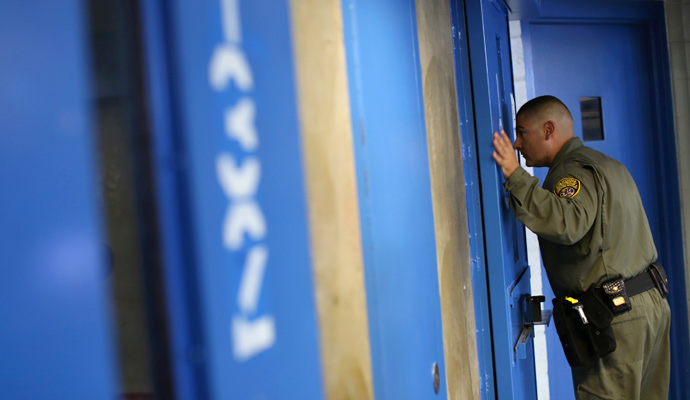Why America still fails to reform its horrible prisons
It's fairly easy to get judges to find unconstitutional conditions inside our prisons. The hard part is getting government to do anything about it.

A free daily email with the biggest news stories of the day – and the best features from TheWeek.com
You are now subscribed
Your newsletter sign-up was successful
It has been nearly two years since officials in Hinds County, Mississippi, made a deal with prison reform advocates to fix the abusive and neglectful conditions at the Henley-Young Juvenile Center. The deal that the parties signed, and that a Republican-nominated federal trial judge approved, required local officials to act decisively to end the "unnecessary use of force, excessive cell confinement, and denial of rehabilitative treatment and services" that had deprived the inmates at this juvenile detention center of their constitutional rights to be free from cruel and unusual punishment.
Victory, right?
Wrong.
The Week
Escape your echo chamber. Get the facts behind the news, plus analysis from multiple perspectives.

Sign up for The Week's Free Newsletters
From our morning news briefing to a weekly Good News Newsletter, get the best of The Week delivered directly to your inbox.
From our morning news briefing to a weekly Good News Newsletter, get the best of The Week delivered directly to your inbox.
Hinds County's utter capitulation in the lawsuit, including the stipulation that it needed to fix scores of problems within the facility, has accomplished virtually nothing in two years. So little progress has been made, in fact, that reform advocates had to go back to court last week and seek to hold county officials in contempt for their lack of action.
The contempt motion is profoundly frustrating to read. Following his last of five visits to the facility since 2012, the court-appointed monitor revealed that the county still has not reached substantial compliance "with any of the 71 provisions set forth in the settlement agreement." Even in those areas in which the county initially improved conditions, the special monitor says there is evidence of backsliding. The "facility is dirty again and unkempt. The units have a strong odor of urine. There is also graffiti resurfacing in the rooms and on the units."
Dangerous conditions still exist inside the facility. One female youth was reportedly bitten by a staff member during an altercation. Another staff member "instructed a youth to clean up another youth's blood without being provided proper protective gear" and, perhaps most important, mental health care for these young people is virtually non-existent, in part because there isn't enough staff inside this facility, and the staff that is there is woefully undertrained for the job. On and on it goes.
All of this is bad — immoral, really. But what makes it so much worse is how common it is. Not just the deplorable conditions in which the nation's incarcerated are held, but the impotency with which the courts deal with these acknowledged constitutional violations. Even when civil rights lawsuits against prisons succeed in identifying unconstitutional conduct, the inmates and their advocates end up having to continue to litigate, sometimes for decades, to press prison officials to do what they are legally bound to do. It's not just Mississippi. It's also Pennsylvania, Arizona (where Maricopa County Sheriff Joe Arpaio refuses to comply with his constitutional obligations), and, famously, California.
A free daily email with the biggest news stories of the day – and the best features from TheWeek.com
The executive branch, which is primarily responsible for prisons, never wants to reform them as quickly as the law requires for the same reasons that the conditions in these facilities are so deplorable in the first place. There is little political upside in doing so. Even if there were the political will to quickly implement reform in these facilities — and there almost always isn't — there would be practical obstacles. The prison guards' union would object. Or maybe there wouldn't be enough money in the budget for adequate staffing of the facilities or for the training of corrections officials or doctors.

This is where the legislative branch comes in. Prison officials can always tell the courts — and often do — that they would love to reform their facilities more quickly but don't have the money to do so without jeopardizing public safety. The legislature must increase its criminal justice budget to pay for the reforms, executive branch officials say. Naturally, the legislators object to paying that price because their constituents aren't clamoring for it and because they don't agree with the judicial decision that required the reform in the first place. No politician in Mississippi, I reckon, ever got elected on a prison reform platform.
All of which brings us back to our judges — federal and state — who have concluded that many of the nation's prisons are unconstitutionally cruel. They tend to tread softly since they are intruding directly into the core functions of the other two branches. When they declare that reform must come to a prison, that the men and women living there must be given adequate care and treatment, these judges are essentially telling the executive branch that it is violating the law while telling the legislative branch that it has to pay to fix it. And they are doing so without any means to have their orders enforced except with the help of those two branches.
The result is a sort of ritualized soft-shoe in these prison reform cases, with judges writing orders that get more and more urgent in their calls for action, and prison officials becoming more and more passionate in their requests for more time to implement reform, and legislators continually reminding the other two branches that there just isn't going to be the flood of money it would take to finally do things right. Some prison officials have reformed more quickly than others, it is true, but none that I know of have reformed so thoroughly and quickly as to have eliminated even the most important constitutional violations.
Today, the most obvious example of this is the California prison litigation which rolls on even in the wake of the United States Supreme Court's landmark ruling in Brown v. Plata. In that case, decided in 2011, Justice Anthony Kennedy declared that his home state's prisons were so overcrowded and dangerous, and so lacking in basic medical and mental health care, that only the release of tens of thousands of prisoners would fix the constitutional problems in them. Three years later, Gov. Jerry Brown still refuses to do what he is legally required to do — and a panel of federal judges overseeing the case refuse to force him to do so.
Because of the tensions between the branches that these cases necessarily generate, there are no easy solutions. The best solution, in fact, is the one judges are loathe to deploy. States or counties that are not in compliance should be fined by the court a substantial amount for each day of non-compliance, or for each day in which the judge remains unconvinced that reform measures are meaningfully underway. The problem is that this judge then has to figure out a way to enforce that fine. That would likely mean a showdown between the branches. And that is something that few judges want to engage in.
The flip side of all of this is that the executive and legislative branches could undertake the reforms they are required to undertake and then blame the judiciary for it — telling their respective constituents that they aren't making the prisons and juvenile facilities safer because they want to, but because they have to. I suspect that most judges who preside over those cases, and who come to understand how grim and dangerous these prisons are, would welcome that public demonization if it meant that juvenile inmates were more quickly provided with the adequate care, medical treatment, and safe supervision to which the Constitution entitles them.
Andrew Cohen is a contributing editor at The Atlantic, a fellow at the Brennan Center for Justice, and a legal analyst for 60 Minutes and CBS Radio News. He has covered the law and justice beat since 1997 and was the 2012 winner of the American Bar Association's Silver Gavel Award for commentary.
-
 Health insurance: Premiums soar as ACA subsidies end
Health insurance: Premiums soar as ACA subsidies endFeature 1.4 million people have dropped coverage
-
 Anthropic: AI triggers the ‘SaaSpocalypse’
Anthropic: AI triggers the ‘SaaSpocalypse’Feature A grim reaper for software services?
-
 NIH director Bhattacharya tapped as acting CDC head
NIH director Bhattacharya tapped as acting CDC headSpeed Read Jay Bhattacharya, a critic of the CDC’s Covid-19 response, will now lead the Centers for Disease Control and Prevention
-
 The billionaires’ wealth tax: a catastrophe for California?
The billionaires’ wealth tax: a catastrophe for California?Talking Point Peter Thiel and Larry Page preparing to change state residency
-
 Bari Weiss’ ‘60 Minutes’ scandal is about more than one report
Bari Weiss’ ‘60 Minutes’ scandal is about more than one reportIN THE SPOTLIGHT By blocking an approved segment on a controversial prison holding US deportees in El Salvador, the editor-in-chief of CBS News has become the main story
-
 Has Zohran Mamdani shown the Democrats how to win again?
Has Zohran Mamdani shown the Democrats how to win again?Today’s Big Question New York City mayoral election touted as victory for left-wing populists but moderate centrist wins elsewhere present more complex path for Democratic Party
-
 Millions turn out for anti-Trump ‘No Kings’ rallies
Millions turn out for anti-Trump ‘No Kings’ ralliesSpeed Read An estimated 7 million people participated, 2 million more than at the first ‘No Kings’ protest in June
-
 Ghislaine Maxwell: angling for a Trump pardon
Ghislaine Maxwell: angling for a Trump pardonTalking Point Convicted sex trafficker's testimony could shed new light on president's links to Jeffrey Epstein
-
 The last words and final moments of 40 presidents
The last words and final moments of 40 presidentsThe Explainer Some are eloquent quotes worthy of the holders of the highest office in the nation, and others... aren't
-
 The JFK files: the truth at last?
The JFK files: the truth at last?In The Spotlight More than 64,000 previously classified documents relating the 1963 assassination of John F. Kennedy have been released by the Trump administration
-
 'Seriously, not literally': how should the world take Donald Trump?
'Seriously, not literally': how should the world take Donald Trump?Today's big question White House rhetoric and reality look likely to become increasingly blurred